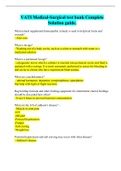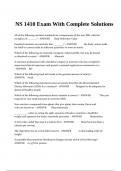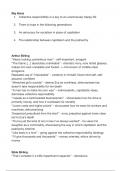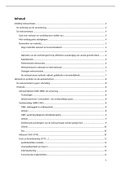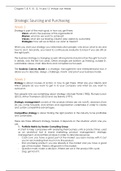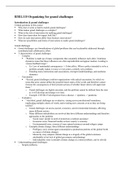‘At the heart of the tragic experience is an overwhelming sense of shame’
In Arthur Miller's Death of a Salesman and Keats’ poems Lamia and The Eve of St Agnes, all
protagonists are inflicted with an element of shame, however this shame is not always at
the heart of the tragic experience but rather a contributing factor. In Death of a Salesman,
although Willy experiences shame at his failure to achieve the American dream and provide
for his family, his eventual suicide is a result of his love for his son Biff. In Lamia, her shame
is at the heart of her and Lycius’ tragic fall as her deception ultimately results in both of their
deaths. Similarly in The Eve of St. Agnes, Madeline's shame, evoked by what she has done
with Porphyro, although ambiguous, can be seen to be the cause of their eventual fleeing.
Subsequently, although shame is not always at the heart of tragic experience, it plays a
fundamental role in these texts.
In ‘Death of a Salesman, Miller presents Willy Loman as a character who is burdened with
shame due to his infidelity and inadequacy as a salesman. The image of Willy ‘on his knees’
when Biff, his son, finds out about his affair with ‘the woman’ is one of great tragedy and
Willy's physical reaction to the overwhelming sense of shame that he feels as a result of
what he has done conveys this to the audience. Furthermore, Miller further presents Willy
as a character who is burdened with shame as a result of his inability to provide for his
family; this shame is highlighted by Miller when Willy replies to Charley, in response to him
offering him a job, ‘I just can't work for you Charley’. Miller’s use of the modal verb ‘can't’
suggests Willy’s inability to leave his job due to his pride. This further comments on the
unattainability of the American dream, as it creates an impossible standard of success-
something that Miller himself experienced when his family lost everything in the Wall Street
Crash of 1929. In spite of this, this sense of shame is not at the heart of the tragedy as it is
ultimately Willy’s love for Biff which drives him to suicide, as he knows that the money his
death will leave can start up Biff’s business. The description of Willy ‘choking with love’
illustrates this affection and overwhelming love Willy has for Biff- the verb ‘choking’
suggests an outpouring or overwhelming amount of love held, which eventually culminates
in Willy’s suicide. Consequently, although this shame Willy feels is fundamental to his
tragedy, at the heart of it lies his love for Biff.
In Keats Lamia, shame lies at the heart of the tragic experience, as it is her shame of her
true form as a serpent woman which inevitably dooms the relationship between Lamia and
Lycius. Unlike some tragedies, Keats’ presentation of both Lamia and Lycius evokes pathos
from the reader. Subsequently, by the end of the poem, Lycius arms are ‘empty of delight’,
and we as readers feel sympathy in great amounts for both Lamia and Lycius. Furthermore,
the futility of Lamia and Lycius’ relationship can be seen to mirror the futility of keeps his
own relationship with Fanny Brawne at the time of writing. Lamia's shame of her true form,
‘playing a woman's part’ inevitably dooms their relationship as it is built on deception, and
subsequently results in the lovers tragic fall as a result of her shame.
In Keats The Eve of St Agnes, the shame Madeline feels at mistakenly losing her virginity to
Porphyro can be seen to lead to their eventual fleeing at the end of the poem. Madeline's
distress as she cries ‘alas alas!’ demonstrates the shame she feels as a result of what she has
done; the exclamatory, short sentences convey her distress at what has happened.
Furthermore, the phrase ‘deceived thing’ further suggests her shame at what she has done;
In Arthur Miller's Death of a Salesman and Keats’ poems Lamia and The Eve of St Agnes, all
protagonists are inflicted with an element of shame, however this shame is not always at
the heart of the tragic experience but rather a contributing factor. In Death of a Salesman,
although Willy experiences shame at his failure to achieve the American dream and provide
for his family, his eventual suicide is a result of his love for his son Biff. In Lamia, her shame
is at the heart of her and Lycius’ tragic fall as her deception ultimately results in both of their
deaths. Similarly in The Eve of St. Agnes, Madeline's shame, evoked by what she has done
with Porphyro, although ambiguous, can be seen to be the cause of their eventual fleeing.
Subsequently, although shame is not always at the heart of tragic experience, it plays a
fundamental role in these texts.
In ‘Death of a Salesman, Miller presents Willy Loman as a character who is burdened with
shame due to his infidelity and inadequacy as a salesman. The image of Willy ‘on his knees’
when Biff, his son, finds out about his affair with ‘the woman’ is one of great tragedy and
Willy's physical reaction to the overwhelming sense of shame that he feels as a result of
what he has done conveys this to the audience. Furthermore, Miller further presents Willy
as a character who is burdened with shame as a result of his inability to provide for his
family; this shame is highlighted by Miller when Willy replies to Charley, in response to him
offering him a job, ‘I just can't work for you Charley’. Miller’s use of the modal verb ‘can't’
suggests Willy’s inability to leave his job due to his pride. This further comments on the
unattainability of the American dream, as it creates an impossible standard of success-
something that Miller himself experienced when his family lost everything in the Wall Street
Crash of 1929. In spite of this, this sense of shame is not at the heart of the tragedy as it is
ultimately Willy’s love for Biff which drives him to suicide, as he knows that the money his
death will leave can start up Biff’s business. The description of Willy ‘choking with love’
illustrates this affection and overwhelming love Willy has for Biff- the verb ‘choking’
suggests an outpouring or overwhelming amount of love held, which eventually culminates
in Willy’s suicide. Consequently, although this shame Willy feels is fundamental to his
tragedy, at the heart of it lies his love for Biff.
In Keats Lamia, shame lies at the heart of the tragic experience, as it is her shame of her
true form as a serpent woman which inevitably dooms the relationship between Lamia and
Lycius. Unlike some tragedies, Keats’ presentation of both Lamia and Lycius evokes pathos
from the reader. Subsequently, by the end of the poem, Lycius arms are ‘empty of delight’,
and we as readers feel sympathy in great amounts for both Lamia and Lycius. Furthermore,
the futility of Lamia and Lycius’ relationship can be seen to mirror the futility of keeps his
own relationship with Fanny Brawne at the time of writing. Lamia's shame of her true form,
‘playing a woman's part’ inevitably dooms their relationship as it is built on deception, and
subsequently results in the lovers tragic fall as a result of her shame.
In Keats The Eve of St Agnes, the shame Madeline feels at mistakenly losing her virginity to
Porphyro can be seen to lead to their eventual fleeing at the end of the poem. Madeline's
distress as she cries ‘alas alas!’ demonstrates the shame she feels as a result of what she has
done; the exclamatory, short sentences convey her distress at what has happened.
Furthermore, the phrase ‘deceived thing’ further suggests her shame at what she has done;




